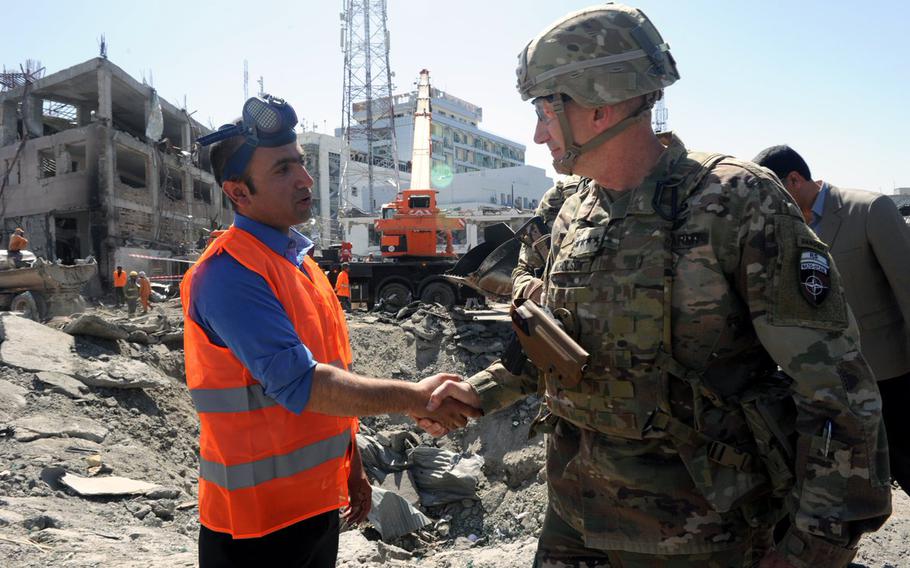
Gen. John Nicholson, commander of U.S. Forces Afghanistan and the Resolute Support Mission, visits the bomb site in Kabul where dozens were killed and hundreds more injured Wednesday, May 31, 2017, when a water tanker laden with explosives detonated on the edge of the heavily fortified diplomatic and government zone. (Resolute Support/Twitter)
KABUL, Afghanistan — A water tanker laden with explosives blew up Wednesday on the edge of central Kabul’s heavily fortified diplomatic and government zone, killing at least 90 people and injuring as many as 350 in one of the deadliest attacks of the 16-year war.
The dead included nine Afghan guards at the U.S. Embassy, a State Department official said. Eleven American contractors were wounded — none with life-threatening injuries — and one Afghan embassy guard is missing, the official said.
The early morning blast occurred next to 20-foot-high concrete walls protecting the German Embassy, just yards from the main entrance to the restricted zone that is home to the U.S. and other embassies, NATO headquarters, the presidential palace and several government ministries.
A NATO spokesman said all U.S. and coalition military personnel were accounted for. Late Wednesday, the Afghan government media center raised the death toll at 90, including women and children.
Gen. John Nicholson, the top U.S. and NATO commander in Afghanistan, visited the site of the blast and consulted with the German ambassador, the spokesman added. The massive attack occurred as the Trump administration is considering thousands more troops to bolster the war against the Taliban and other militant groups, including the Islamic State.
No group claimed responsibility for the attack, but the Taliban said in a statement they were not behind it. The Islamic State, which U.S. and Afghan forces have been battling in the eastern part of the country, has not commented. The group has conducted a series of brazen attacks in the city in the past, including a raid on a military hospital in March that killed at least 30 people.
Photos from the scene showed a heavily damaged building inside the German embassy compound, with much of its facade blown in by the force of the explosion. A member of the Afghan parliament who visited the site said that the explosion, which blew a 30-foot-wide hole in the road, had destroyed part of the embassy. An Interior Ministry spokesman said more than 30 cars and trucks on the street outside were also destroyed.
German Foreign Minister Sigmar Gabriel said in a statement that an Afghan security officer working at the embassy was killed.
“The news from Afghanistan is shocking. I condemn the attack in Kabul, in which dozens of people were injured in killed, in the strongest possible terms,” Gabriel said. A German diplomat who asked not to be named said some staffers had been injured.
Other embassies within the zone also reported structural damage, blown-out windows and damaged doors. In Paris, Marielle de Sarnez, France’s Minister of European Affairs, said her country’s embassy was among those damaged.
The main thoroughfares around the area are typically packed with traffic and commuters around the time of the blast, which occurred at 8:22 a.m.
NATO’s Resolute Support headquarters seemed to suggest that the vehicle had attempted to gain access to the embassy and ministry area, which is surrounded by blast walls and guarded by a series of checkpoints.
“The vigilance and courage of the Afghan security forces prevented the (vehicle-borne improvised explosive device) from gaining entry to the Green Zone,” Resolute Support said in a statement.
Kabul police said the tanker had a permit giving it access to the restricted zone. If so, that would constitute a massive security breach. Only strictly vetted cars and trucks with special passes are allowed onto those roads.
Wednesday is the fifth day of Ramadan, the holy month in the Muslim calendar, when most Afghans fast during the day.
President Ashraf Ghani condemned the attack.
“The terrorists, even in the holy month of Ramadan, the month of goodness, blessing and prayer, are not stopping the killing of our innocent people,” Ghani said in a statement.
Insurgents’ success in pulling off an attack of this magnitude constitutes a massive security failure for a government trying to convince its people it can keep them safe.
A photo from the scene showed investigators deep inside the long and narrow blast hole, which appeared at least 10 feet deep.
NATO condemned the attack and offered condolences to the injured and the families of the dead.
“Attacks such as these only serve to strengthen our commitment to our Afghan partners as they seek a peaceful, stable future for their country,” NATO said in the statement.
Phillip Walter Wellman contributed to this report.boyd.eb@stripes.com Twitter: @ebboyd